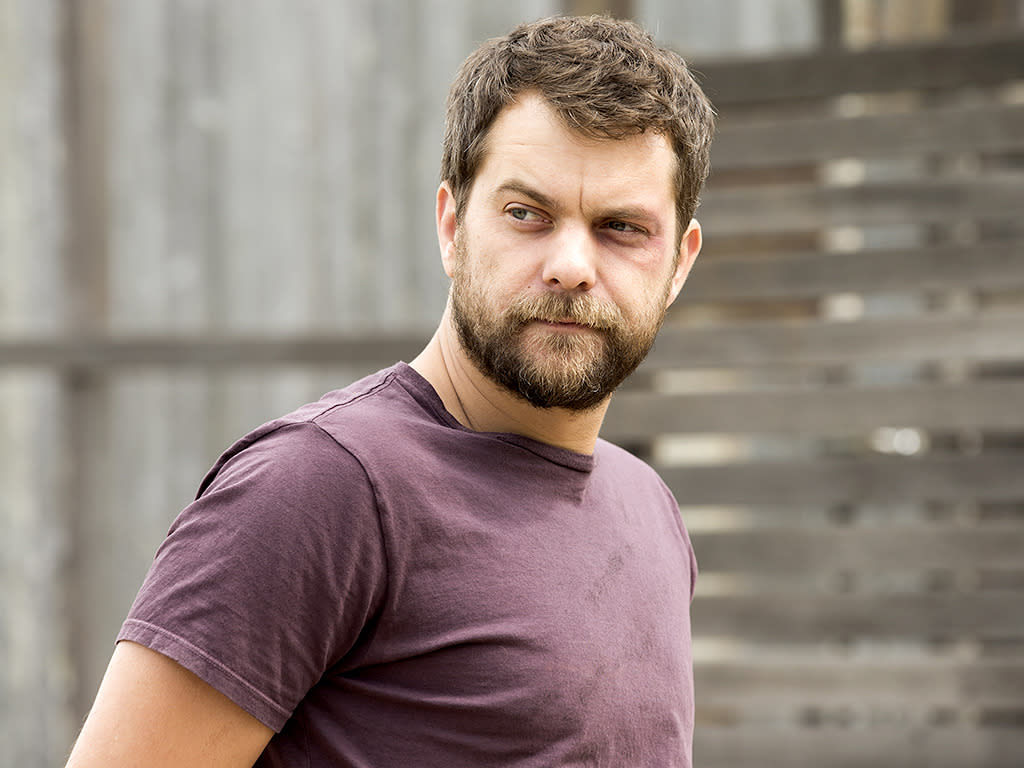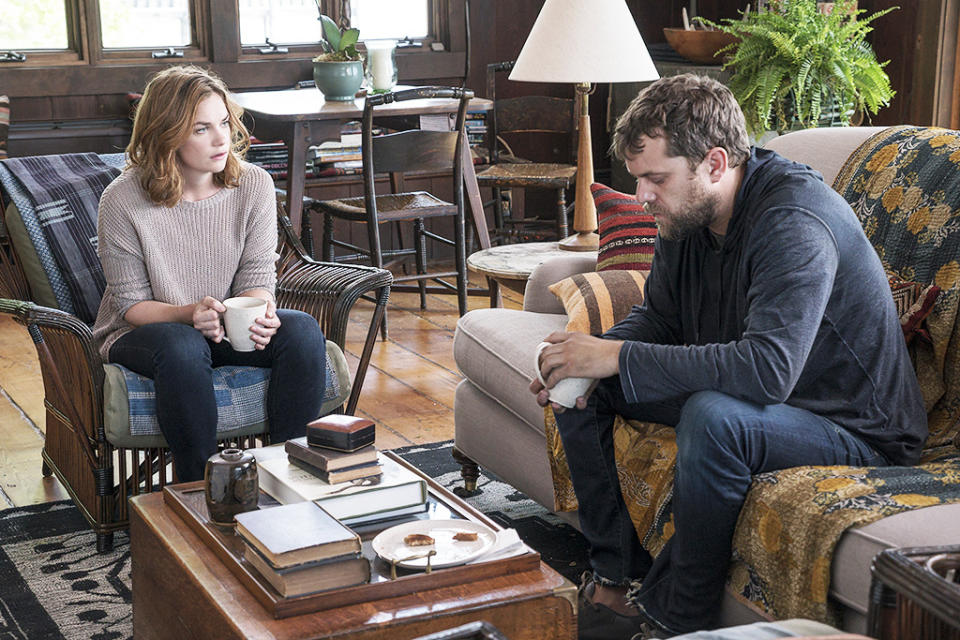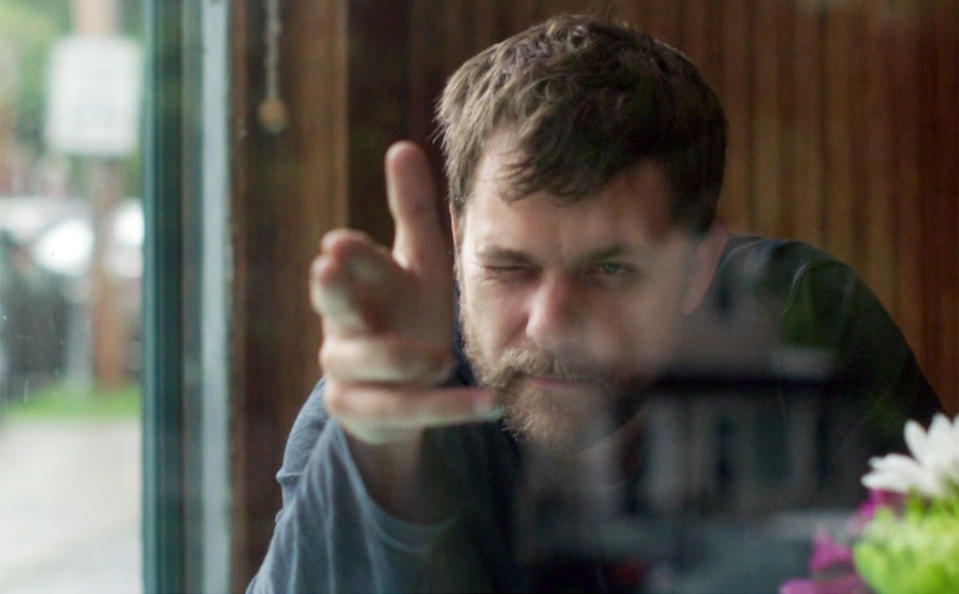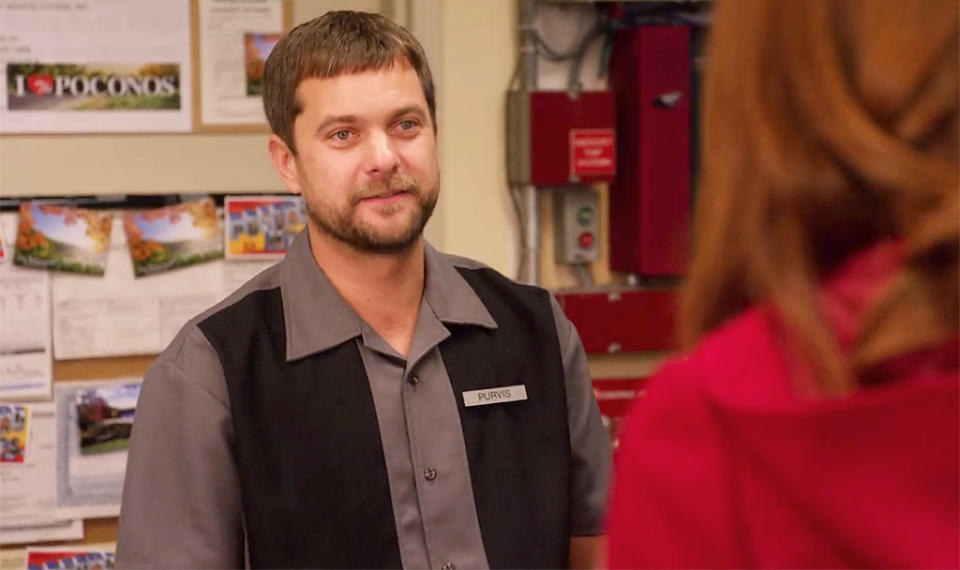Emmy Talk: ‘The Affair’ Star Josh Jackson on Cole’s Point of View and That Fantastic ‘Dawson’s Creek’ Shout-Out in His ‘Unbreakable Kimmy Schmidt’ Guest Appearance

Josh Jackson in Season 2 of ‘The Affair’ (Showtime)
As we enter Emmy season — nomination voting runs through 27 — Yahoo TV will be spotlighting performances, writing, and other contributions that we feel deserve recognition.
Warning: This interview contains spoilers for Season 2 of The Affair and Season 2 of Unbreakable Kimmy Schmidt.
Can you believe it: Pacey Witter just turned 38! Or rather, his portrayer, Dawson’s Creek star Joshua Jackson, did. It was a celebration that was accompanied, he sweetly points out, by his 10-year anniversary with love Diane Kruger.
Jackson could deservedly also be celebrating his first Emmy nomination this summer after his Season 2 performance in The Affair, in which the added point of view of his Cole — the husband Ruth Wilson’s Alison left behind when she began the titular relationship with also-married Noah (Dominic West) — helped flesh out the character into one of the most layered and sympathetic in the story.
Jackson, who also recently made a memorable guest appearance in the second season of Netflix’s Unbreakable Kimmy Schmidt, talked to Yahoo TV about getting to expand on his character, who we got to know from “the outside first”; his hopes for the upcoming third season of The Affair; and how much fun he had on Kimmy, while giving a nod to Dawson’s Creek.
He also recalls how, the last time he spoofed the Creek, he almost ended up in Comic-Con jail, and has an interesting idea for a future Dawson’s Creek project.
Yahoo TV: The Affair hooked me in Season 1, but the extra perspectives, from Cole and Helen, added so much to Season 2.
Josh Jackson: First, thank you, and I do think that you couldn’t have had the second season without the first season; I think it would have been probably too busy to have those four storylines happening at the same time if you had no prior knowledge of what the show was. I think the second season definitely allowed us to spin the story and, certainly as an actor, it was just fantastic to go from being an object to a subject of the show.
Did you know that was the plan for the show when you signed on, that Cole and Helen’s points of view would be added in Season 2?
No, I don’t think that actually was the plan when we signed on. I think initially [series creator] Sarah [Treem] wanted to just occasionally go over some important piece of information that we’ve seen before from [Helen or Cole’s] perspectives, but then I guess in the off-season she expanded that idea to make them two dedicated, alternate perspectives.
Did it feel like you were playing a completely different character in Season 2?
At certain times, yes. Particularly [different from] when we meet Cole. When we come back in Season 2, he’s completely broken, just emptied out inside. He’s not at all the sort of swaggering, masculine man he was in the first season. It felt like we were starting from a completely different place, and I also thought it was a fun place for me to get to play, because to see a character from the outside first — particularly one who was portrayed as being stoic to a fault, proud to a fault, and strong in both a really positive and sometimes negative way — to see how that person is actually feeling on the inside, was a really interesting place to build out from. Because we’ve all known those people in our lives, or we’ve been those people for other people, where they think, “Well, you are the strong one. You can handle it,“ and it was interesting to go inside one of those characters and show that, actually, no, he’s not doing very well. He’s not handling this at all.

Ruth Wilson and Jackson (Showtime)
Especially in the second episode of Season 2, which I think is one of your best performances, it was heartbreaking. In Cole’s version of the story, what’s most hurtful to him is that it’s as if, for Alison, their relationship, their life together, kind of didn’t exist. In her version, when he visits her at the lake house, she’s annoyed to see him and she’s almost afraid of him. In his version, she’s happy to see him, and she brings up that great day they had together during their marriage. It’s almost like he just really, more than anything, wants some acknowledgment that their life together mattered.
I think that’s exactly right. I think everything in his life was built around outside observation. He was a good family man, he was a good son, he was a good rancher, he was an upstanding member of the community to a certain extent, and all of those things were erased — and most severely, erased in his relationship with his wife. His child is dead, his wife is gone, and suddenly he doesn’t exist because he never bothered to ask himself, "Who am I for me?” That’s what I think the second season is for him: him coming to terms with who the hell he wants to be outside of everybody else’s expectations of him.
And even though he isn’t handling the breakup well, he does force everyone in his life to give him time to figure his life out, and they certainly don’t want to. Everyone but Alison still wants things from him. His family is making demands of him, very selfish demands, but he is self-aware enough to make them give him that opportunity to figure it out.
To take that space. Two things: one, I can’t tell you how lucky I feel to work on this show. They give the character an opportunity to work almost entirely in silence. That second episode that you’re talking about, Cole’s side of it is not wordless, but it’s pretty close to it for a half hour of television. I’ve worked on a lot of wordy shows, and I’ve worked on a lot of wordy movies, and generally speaking, people are afraid of silence. There’s a lot of moodiness in that episode that they give an opportunity to really play out, and then, yes, I do also think that if you were to look at the dynamics of the Lockhart family, in a healthy version, they’re an interdependent family. But really what they are is totally codependent upon each other. None of them really work as an individual; they all just have these pretty destructive roles they play inside of that family, and so long as everybody’s playing their role, the machine keeps on working. But as soon as somebody says, “No, I don’t want to do this anymore,” the whole thing comes apart, and you see that whole family just dissolve.
Why do you think Cole is the only Lockhart who can take himself out of the chaos and figure things out?
Because everything fell apart for him. Everybody else was able to go on with some version of their own fiction, but Cole’s faith in his mother is destroyed. Cole’s belief in what the family means or existed for is taken away. The family place in Montauk is lost when they lose the ranch. His child is already gone, and his wife leaves him. All of the pillars of his self identity are erased, so I don’t know that he made the choice proactively, but I do think that from that terrible space he eventually started making proactive decisions to finally become a man, to become an independent human being.

(Showtime)
Does the cast have a lot of input shaping the characters on the show?
Yes. I mean, we don’t generally deviate too much from the text once we get to the floor, but there’s a pretty open dialogue. Not in the writing process, because that’s the writers’ time, but once it gets to us and we do the read-throughs, there’s an open dialogue, both individually, actors to writers, and then collectively, actors and scene mates, to wrap your head around it. Because quite often, [the story] is dense, and you’re alluding to something that you might not know of yet, so trying to make sure that you’re fitting scenes inside of the broader arc of the story, but then also because the show does allow for spaces of silence and it lives in those small, often awkward sometimes wrenching places between people, it’s up to us actors and the director on set to make the most suspense out of that as possible. And we do have quite a bit of leeway once we put out a scene, to play around with it until it finds the shape that you see on camera, because that’s not always the case.
I’ll cop to it: quite often your take on reading [a script] alone is one thing, but you put it on tape against somebody who’s pretty great — I have the benefit of working with some pretty fantastic actors on this show — and you go, “Oh, I did not see that at all, but we should go there for a little while.” And we actually have the time and space on set to do that, which is really unusual.
That’s one of the benefits of the cable-length TV season versus 22 or 24 episodes?
Yes, for a variety of reasons. First off, creative burn out — nine months a year at 70 hours a week, it’s not a human scale of labor. Nobody’s really all that sharp when you get deep into those seasons, so for pure exhaustion reasons, a lot of that doesn’t happen [on broadcast shows]. But then also, the network mandate and the commercial-driven mandate is keep it moving, keep it interesting, do not give them an opportunity to stop or think or be uncomfortable, because they’ll change the channel. Our mandate is exactly the opposite: Push in to those uncomfortable places. You’re allowed to be in silence. You’re allowed to be awful. Some of these characters are sometimes just terrible people, and they do cruel, terrible, mean things to each other, often in an offhanded way, which I think is the cruelest thing you can do to somebody. And that’s not just about that 10-episode format, it’s about the difference in sort of the creative drive between doing something that’s for commercial broadcast television and something that is on Showtime, on a subscriber basis.

(Showtime)
A lot of major things were revealed in Season 2: the murder, who was directly responsible, who else was involved, the question about the paternity of Alison’s baby. What will the overall theme of Season 3 be?
I know that everybody else [already] has a little bit of an understanding of what Season 3 is, but I know zippo, because when everybody else was doing their meetings with Sarah before she had a baby, I was in New York doing a play, so I didn’t have the opportunity to go in. … Should they so desire, they could do really anything they want with the format now, because the question of “who done it?” is all resolved, so we’re kind of in uncharted territory. In my opinion, the show works at its best when it’s reduced in scale, unlike a lot of shows. If you’re talking about something like Game of Thrones, that works at its utmost epic scale, and is at its best when it’s telling huge, huge stories, but ours is exactly the opposite. Ours is at its best when it’s about the tiny little moments between people and how we manage those or don’t, and the fallout that even sometimes seemingly small decisions have on the people around you.
What do you most still want to know about your character?
I want to know, now that he has stepped into himself — he had a spurt of growth, and fell in love again, and that was amazing, but then ultimately chose to go back to the net, back to Montauk, back to the place where he feels most comfortable — is he a man who is just fundamentally incapable of being independent? Can he not feel full unless he is in this place? And if that’s the case, is that his fatal flaw? Is he condemning himself to repeating the cycle of tragedy and distrust and heartbreak, because he just doesn’t have the bravery to fully step out of that place? I don’t have an answer for that yet.

Jackson guesting in Season 2 of ‘Unbreakable Kimmy Schmidt’ (Netflix)
On a lighter note, let’s talk about your guest appearance on Unbreakable Kimmy Schmidt, which is one of the most delightful surprises of Season 2. How did Purvis, the Dawson’s Creek-obsessed convenience store clerk, happen? How did that come about?
Purvis happened because one day I got an email from Tina Fey, which was pretty awesome. I definitely had to check and make sure it wasn’t a joke. She sent this really nice email, not knowing that I had devoured the first season of the show and was already a fan, and she was like, “I can send you the pages.” I was like, “Yeah, sure, of course you should, but the answer is yes!” Then, after just going and playing there for a day… I don’t know why, but I haven’t done much comedy, and that show is just excellent, and they are all excellent, and the dialogue is crackling, and it’s a totally different environment working on a comedy than it is on a drama, and it was funny. It was funny and fun to just get to drop in there for a day and wink at my youth, my misspent youth.
Pacey-Con with Joshua Jackson from Joshua Jackson
It made me think about your Funny or Die Pacey-Con video. How did this Dawson’s throwback experience compare to Pacey-Con?
Pacey-Con nearly got me locked up in the San Diego Convention Center jail. They don’t have a sense of humor about anything. This is slightly less dramatic.
Is that true? You really got into trouble with Comic-Con security?
Yeah. I just tried to enter into Comic-Con with full bluster, thinking that they would maybe go along with the joke for a second, but that was not the case. This was not a joke for them. And at the time I was there [to attend Comic-Con] for Fringe, and they had to call Warner Bros. It just became really unfunny for everybody.
What was the funniest part of playing Purvis?
Honestly, because I’ve spent so little time on comedy, that’s a pretty well-oiled machine, and they were already deep into their second season, and because Ellie [Kemper] is so, so good, the whole thing took three hours. What was most fun for me was giving her something to be able to bounce off of. She’s fantastic, and that’s a great character for her, and to just sit back and watch her work and mime material as she sort of discovers a word or a phrase or something that she likes that makes her laugh, and all of a sudden we just go off into that for a second, it’s a lot like what we do on The Affair, except for we always end up with somebody crying.
Did you have a hand in any of Purvis’s story or dialogue? Was he already named Purvis?
The name was already there. I can’t remember exactly, maybe I’m giving myself undue credit, but I think there was one thing that I called out that actually wasn’t true to [Dawson’s Creek], but in general, they’d done all the work for me. I just had to show up and say the lines.
And you have to love the fact that Purvis got to point out that Pacey, not Dawson, ended up with Joey.
Still settling scores after all these years.
That’s right. For we Pacey-devoted, that must always be pointed out. You have commented in the past that you don’t really see a Dawson’s reunion ever happening, but there have been so many recently with Full House and The X-Files and Twin Peaks and Gilmore Girls. Is there any situation in which you could envision a Dawson’s revival, even a one-time thing like a Netflix movie?
I don’t think so. One of the characters is dead, so it kind of takes away from the fun of doing it if you don’t have the whole gang back. Who knows, never say never, but I can’t really envision a scenario where that would be fun. Also, I think there’s a part of me that just thinks it’s better to leave those things alone, or maybe let somebody else do it. Give it to another generation of kids, like they did with 90210, so maybe eventually that will happen. No, the short answer is no. I can’t imagine a scenario in which that would happen.
Are Pacey and Joey still together in your mind?
Of course. It was a romantic show. Maybe it’s been tempestuous. Maybe there have been a couple of breakups along the way, but since they’d also be closing in on 40, maybe they realize that they’re better off together.
Maybe it’s Pacey and Joey’s kids who do the spinoff.
Exactly. Crazier things have been pitched to me, trust me.
I hope we see Purvis again.
It was a little bit ugly, I’ll be honest with you, when I left that day at Kimmy Schmidt. I was like, “I don’t generally do this, but if you ever need me to come back for this character or any other character, just putting it out there that I will do that in a heartbeat.” [Laughs] Tina just rolled her eyes and then left.
The Affair Season 2 is streaming on Amazon Video and iTunes.
Unbreakable Kimmy Schmidt Season 2 is streaming on Netflix.
Read more Emmy Talks:
Emmy Talk: ‘Bates Motel’ Showrunners
Emmy Talk: ‘OITNB’ Star Selenis Leyva
Emmy Talk: ‘AHS: Hotel’ Star Denis O’Hare
Emmy Talk: ‘Better Call Saul’ Star Rhea Seehorn
Emmy Talk: ‘Master of None’ Co-creators Aziz Ansari and Alan Yang
Emmy Talk: ‘People v. O.J. Simpson’ Star Sterling K. Brown
Emmy Talk: ‘The Americans’ Star Alison Wright
Emmy Talk: ‘Jessica Jones’ Star David Tennant
Emmy Talk: ‘The Grinder’ Fred Savage
Emmy Talk: ‘Silicon Valley’ Star Thomas Middleditch
Emmy Talk: ‘Crazy Ex-Girlfriend’ Songwriting Duo Rachel Bloom and Adam Schlesinger
Emmy Talk: ‘House of Cards’ Star Joel Kinnaman


